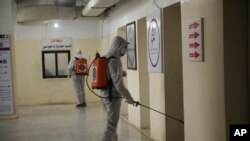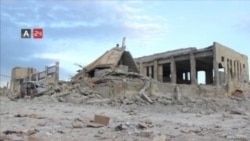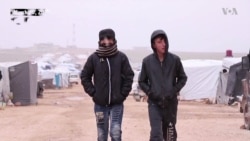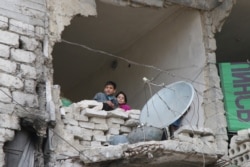In northwestern Syria, where Syrian government forces backed by Russian air power have led a military campaign against rebel groups, medical workers are warning that a coronavirus outbreak could bring disastrous consequences because of a lack of medical equipment and infrastructure in the province.
Ihsan Eidy, a physician in Idlib, told VOA that fierce battles between the regime forces and rebels in Syria’s northwestern governorate since December have made the region particularly vulnerable to the spread of the highly contagious virus. While no cases of novel coronavirus have been reported yet, he said that unoperational health facilities, overcrowded refugee camps, and lack of necessary nutrients and basic sanitation have raised alarm among Idlib residents.
“Many hospitals and medical clinics went out of service and there is a tremendous pressure on the remaining, already exhausted health care facilities in Idlib. All that the medical workers can do to deal with this issue now is to spread awareness among people,” Eidy said.
The Syrian physician, who remains determined to stay in Idlib to help civilians affected by war, said the COVID-19 outbreak could be an “uncontrollable disaster,” as medical workers in the region struggle to obtain basic equipment such as masks and ventilators.
“In the hospital that I am working with, there is only one ventilator. All we can do is to take preventive steps like closing schools and organizing awareness campaigns among people regarding hygiene. But it’s impossible to distance people in refugee camps where you could find 20 people living in one tent,” he told VOA, adding that local authorities were struggling to enforce a lockdown.
“People are already in distress. They have already lost everything. Many are indifferent regarding this because they see it as yet another disaster added to their lives,” Eidy said.
According to the World Health Organization, more than 500 medical facilities in Syria have been targeted in military attacks, causing the deaths of dozens of medical staff and patients. It has been estimated that two-thirds of the facilities are in the northwest region.
Denial
Rebel groups this month said they had closed most public places in Idlib as well as crossing checkpoints with the Syrian government areas. The measures came after local media reported that regime-controlled towns could have been exposed to the virus.
“The three checkpoints [Alhamran, Oun al-Dadat and Abu al-Zindin] will be closed for 15 days as a precautionary procedure to prevent the spread of the virus in the free areas,” the opposition Syrian Interim Government said in an official statement.
Human rights groups and local sources say that there are dozens of confirmed cases throughout various governorates under the control of President Bashar al-Assad. The Syrian government, however, maintains that it has no cases.
The Syrian Observatory for Human Rights, a U.K.-based Syrian war monitoring group, said it had obtained information that as many as 113 people had tested positive so far.
The head of the observatory, Rami Abdulrahman, told VOA that two of the confirmed cases had died — an Iranian man in Damascus and a Syrian nurse in Tartous city, west of Homs.
“The virus came to Syria with Iranian visitors who were visiting the Shiite holy shrines in Syria,” Abdulrahman said.
Earlier this week, the head of the Ministry of Tourism in Damascus, Wael Kayal, announced that Syrian authorities were closing all holy shrines and halting religious trips from Iran and Iraq for the next two months. Kayal said the measure was part of the decision by authorities in Damascus to postpone all planned events and prevent public gatherings.
“Fears grow that the virus might hit all Syrian areas, whether under Syrian regime control, under Syrian Democratic Forces (SDF) control or rebel-held areas. Syrians in all territories are in danger,” Abdulrahman said.
A decade of war
The Syrian war this week entered its 10th year, with more than 380,000 dead and 13 million displaced inside and outside the country. More than 4.8 million children are reported to have been born into war and know only life in this brutal conflict.
Geir Pedersen, the U.N.’s special envoy to Syria, in a statement marking the grim anniversary of the war said that more than a million people had been displaced in the past three months in Idlib alone. Pedersen called the failure to resolve the situation in Syria a “collective failure of diplomacy.”
“The suffering of the Syrian people during this tragic and terrible decade still defies comprehension and belief,” Pedersen said in his statement.
“Hundreds of thousands of Syrians, men and women, have lost their lives. Hundreds of thousands have been detained, abducted or are missing. Human rights abuses, crimes, destruction and destitution have taken place on a monumental scale,” he added.








